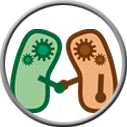Team:Calgary/Notebook/Protocols/Process21
From 2011.igem.org
(Difference between revisions)
(Created page with "{{Team:Calgary/Main_Header|notebook}} {{Team:Calgary/Notebookbar| TITLE=Plasmid extraction from <i>E. coli</i>| BODY=<html> <p>This protocol is taken from the Sigma Aldrich dist...") |
|||
| Line 4: | Line 4: | ||
BODY=<html> | BODY=<html> | ||
| - | <p>This protocol is taken from the | + | <p>This protocol is taken from the GenElute Miniprep Plasmid Preparation Kits distributed by Sigma Aldrich. We modified the elution portion of the procedure by using double distilled water to elute rather than using TE buffer. We also skipped the step with the optional wash solution. Instead, the step with the addition of Wash Solution in the Column Tube was done twice.</p> |
| - | We also skipped the step with the optional wash solution. Instead, the step with the addition of Wash Solution in the Column Tube was done twice | + | |
<ol> | <ol> | ||
Revision as of 02:28, 28 September 2011









Plasmid extraction from E. coli

This protocol is taken from the GenElute Miniprep Plasmid Preparation Kits distributed by Sigma Aldrich. We modified the elution portion of the procedure by using double distilled water to elute rather than using TE buffer. We also skipped the step with the optional wash solution. Instead, the step with the addition of Wash Solution in the Column Tube was done twice.
- Make overnight cultures from LB agar plate growth (The protocol for the making of overnight cultures can be found as a separate protocol).
- After allowing approximately 16 hours of growth, pellet the cells using a centrifuge for 20 minutes at a speed of 4000 rpm at 4°C.
- Discard the supernatant, while being careful not to discard any of the pellet.
- Resuspend the pellet in 200 µL of Resuspension Solution (with RNase A added) provided from the kit.
- Transfer the solution from a Falcon tube to a 1.5 µL microcentrifuge tube.
- Add 200 & µL of Lysis Solution and invert gently to mix. Allow the mixture to clear for less than 5 minutes.
- Add 350 & µL of Neutralization Solution and invert the tube 4-6 times to mix.
- Pellet the microcentrifuge tubes at 14000 rpm using a microcentrifuge for 10 minutes. The resulting solution is the lysate.
- Add 500 µL of the Column Preparation Solution to a binding column inside a collection tube. Centrifuge this tube for 1 minute at 14 000 rpm and discard the liquid underneath the binding tube.
- Transfer the lysate into the binding column, being careful not to transfer any solid. Discard the microcentrifuge tube with the solid.
- Centrrifuge the collection tube at 14 000 rpm for 1 minute. DIscard whatever liquid flowed through the binding column into the collection tube.
- Add 750 µL of Wash Solution with concentrated ethanol added to the column and spin at 14 000 rpm for 1 minute. Discard the liquid that flowed through into the collection tube.
- Repeat Step 12 a second time with the same quantity of Wash Solution.
- Centrifuge the tube for 1 minute at 14 000 rpm to dry the column.
- Transfer the column to a new 1.5 mL microcentrifuge tube.
- Add 50 µL of double distilled water to the column and spin for 1 minute at 14 000 rpm.
- Use a spectrophotometer to measure the concentration and the purity of your plasmid.

 "
"






